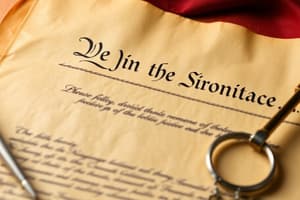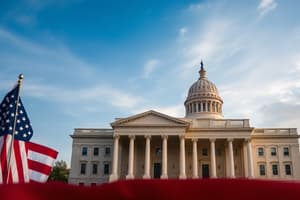Podcast
Questions and Answers
What describes the role of the Great Compromise in the development of the US Constitution?
What describes the role of the Great Compromise in the development of the US Constitution?
- It established a system of checks and balances.
- It solely favored large states in Congress.
- It combined the Virginia and New Jersey Plans into a bicameral legislature. (correct)
- It eliminated the need for a Bill of Rights.
Which of the following powers is classified as an implied power under the US Constitution?
Which of the following powers is classified as an implied power under the US Constitution?
- Regulating interstate commerce.
- Declaring war.
- Establishing a national bank. (correct)
- Levying taxes.
What is the primary function of the Electoral College in US presidential elections?
What is the primary function of the Electoral College in US presidential elections?
- To oversee the impeachment process of the President.
- To directly elect the President by popular vote.
- To mediate between the states and the federal government.
- To formally elect the President based on state votes. (correct)
In which case did the Supreme Court establish the principle of judicial review?
In which case did the Supreme Court establish the principle of judicial review?
Which of the following is a characteristic of a dual federalism system?
Which of the following is a characteristic of a dual federalism system?
Which of the following is a function of political parties in the US electoral system?
Which of the following is a function of political parties in the US electoral system?
What is a major consequence of the incumbency advantage in congressional elections?
What is a major consequence of the incumbency advantage in congressional elections?
What does the Supremacy Clause establish in the context of federal and state laws?
What does the Supremacy Clause establish in the context of federal and state laws?
Flashcards
Direct democracy
Direct democracy
A system where citizens directly vote on laws and policies.
Republic
Republic
A system where elected representatives make decisions on behalf of the people.
Dictatorship
Dictatorship
A system where one person or a small group holds absolute power, often through force.
Social Contract Theory
Social Contract Theory
Signup and view all the flashcards
Expressed/Delegated Powers
Expressed/Delegated Powers
Signup and view all the flashcards
Reserved Powers
Reserved Powers
Signup and view all the flashcards
Implied Powers
Implied Powers
Signup and view all the flashcards
Concurrent Powers
Concurrent Powers
Signup and view all the flashcards
Signup and view all the flashcards
Study Notes
Unit 1: Foundations of US Government
- Forms of Government: Republic, direct democracy, dictatorship
- Social Contract Theory: Explores the relationship between individuals and government.
- Natural Rights: Inherent rights, such as life, liberty, and pursuit of happiness.
- Ideals of US Democracy: Liberty, equality, and self-government.
- Causes of American Revolution: Motivations for the American revolution.
- Declaration of Independence: Document declaring the colonies' independence from Britain.
- Great Compromise: Resolution addressing representation in Congress.
- Virginia Plan & New Jersey Plan: Initial proposals for the structure of government.
- Federalists vs. Anti-Federalists: Arguments over the ratification of the Constitution.
- Articles of Confederation: First governing document of the US, its shortcomings.
- Weaknesses of Articles of Confederation: Issues leading to its replacement.
- Shay's Rebellion: Major event highlighting weaknesses of the Articles of Confederation.
- Checks and Balances: System to prevent any branch of government from becoming too powerful.
- Separation of Powers: Division of government authority among three branches.
- Federalism: Distribution of power between national and state governments.
- Expressed, Reserved, Implied, Concurrent Powers: Types of governmental powers.
- Supremacy Clause & Elastic Clause: Key clauses impacting government power.
- Cooperative Federalism vs. Dual Federalism: Distinct models of federal-state interaction.
- Role of Civil War & New Deal: Shifting power dynamics between federal and state governments.
Unit 2: Congress & Presidency
- Elections: US election system
- Constitutional Design: Founders' intentions/goals in designing government
- Bicameralism: Two-house legislative system (Congress).
- Census, Reapportionment, Redistricting, Gerrymandering: Processes affecting representation and voting districts.
- Incumbency Advantage: Benefits held by current officeholders.
- How a Bill Becomes Law: Detailed steps in legislation process
- Appropriations: Funding for governmental agencies.
- "Power of the Purse": Congress' role in controlling the government's budget.
- Roles/Powers of the President: Specific powers and responsibilities of the president.
- Qualifications of Representatives, Senators, President: Specific requirements for holding office.
- Mandatory vs. Discretionary Spending: Different types of government expenditures.
- Major sources of revenue & expenditures: Key components of federal budget.
- Congressional Leadership Positions: Key leadership roles within Congress.
- Presidential Election Process: Steps leading to a presidential election
- Electoral College: The process for electing US Presidents.
- Swing State vs. Safe State: Different types of states in presidential elections.
Unit 3: Linkage Institutions
- Media: Role of media in political communication
- Uses/Abuses of Public Opinion Polls: Impact and manipulation of polling data
- Elements of a Scientific Poll: Key factors affecting poll accuracy
- Liberal vs. Conservative Ideology: Different political ideologies
- Party Platforms: Sets of values and beliefs guiding a political party.
- Voter Behavior Trends: Pattern of voter participation.
- Role of Third Parties: Influence of third parties.
- Lobbyists: Advocates persuading government decision makers
- Functions of Political Parties vs. Interest Groups: Key distinctions between these groups.
- Campaign Finance: Sources and regulations impacting campaigns
- BCRA of 2002, Citizens United, Buckley v. Valeo, Super PACs: Key legislation and court cases influencing campaign funding.
Unit 4: Judicial Branch
- Constitutional Design: Intent/goals of the framers
- Judicial Review: Power of the courts to examine laws
- Marbury v. Madison: Landmark Supreme Court case establishing judicial review.
- Originalism vs. Living Document: Different schools of juducial interpretation
- Term Length of Justices: Time spent in service on the Supreme Court
- Constitutional Clauses: Specific elements within the Constitution
- Plessy v Ferguson, Brown v Board of Education: Landmark cases regarding racial equality.
- Constitutional Amendments: Changes to the original document.
Studying That Suits You
Use AI to generate personalized quizzes and flashcards to suit your learning preferences.




